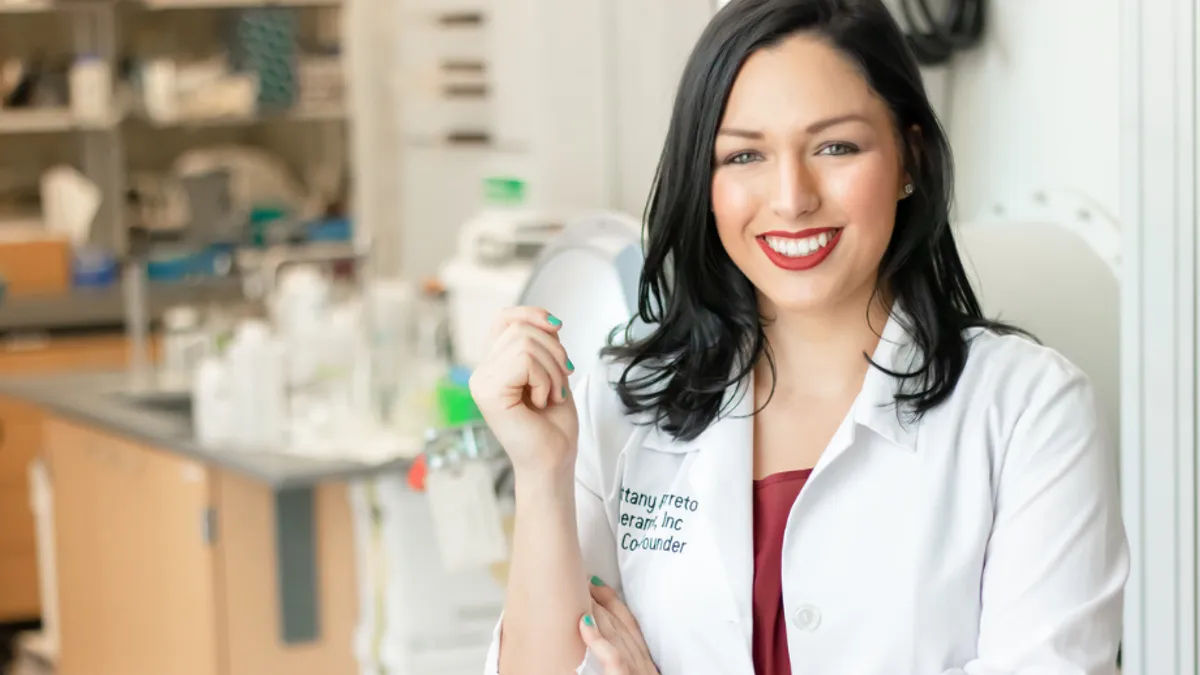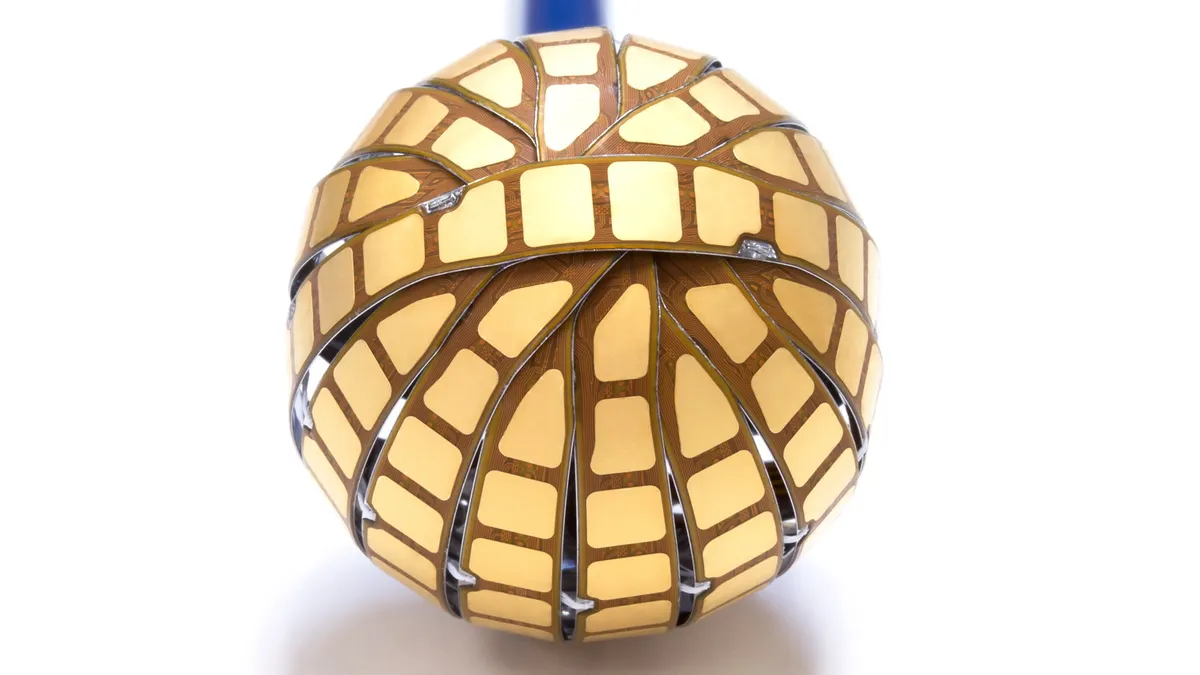FemTech Focus Executive Director Brittany Barreto is on a mission to improve women’s health outcomes through her work supporting investment and innovation in the FemTech sector. She views the women’s health space as ripe for investment due to historic underfunding and underrepresentation in medical research and product development.
Through her three-year-old nonprofit organization and the venture fund Coyote Ventures, which has raised $10 million from investors including Bank of America, the Ph.D. in molecular and human genetics is helping to create an ecosystem dedicated to addressing conditions unique to women, females and girls, or that affect them disproportionately or differently.
This interview has been edited for length and clarity.
MedTech Dive: What exactly is FemTech?
Brittany Barreto: The term was coined by Ida Tin. She's the founder of Clue, which is a period-tracking app. She said it at a conference in New York City in 2016 because she was trying to describe how there are these unique barriers to women's health innovation. And so just calling it health tech is a disservice to it because there are so many unique caveats and barriers we face that other medtech companies don't have to deal with. Essentially, she said, it's FemTech.
At FemTech Focus, we actually established the definition in 2020 as solutions to conditions that solely disproportionately or differently affect females, women and girls. And so, with that definition, you now include things like heart disease, which manifests differently in our bodies, or autoimmune disease, which disproportionately affects us.
Why is the timing right for innovation in women's health technology?
We believe there are three main reasons why FemTech is on the rise now. The first is that over 90% of our founders are female. And that's a really interesting statistic because it's not a requirement to be a woman to start a women's health company. But it's predominantly women who are starting these companies.
What we find is that the rise of women in STEM and finance has led to an increase in the numbers of women's health businesses that are being created. Most of our founders are engineers, or software coders or medical doctors, or investors or business insight people, women who are tired of the status quo, and now have the skill sets to do something about it.
And then the second reason, COVID really illuminated to all of us that not everyone gets the same health care, based on your race, your zip code. Then when we add in things like gender or sex, people have started to say, "Oh, I've heard of this," and so it's an easier conversation to talk about in terms of, you can walk into the same hospital, but depending on who you are, you have different healthcare services available to you.
And then, historically, women have been excluded from scientific research and healthcare innovation due to the excuse of not being able to compensate for their hormones. But now, we live in a world with AI drones on Mars, and we are capable of taking hormone fluctuations into account.
What is FemTech Focus doing to solve this problem?
We have two missions. The first is to raise awareness of the need for sex-specific healthcare innovation. And [the second] is to support the founders innovating in that space. We do that through four main mechanisms. We have a podcast, a virtual community, market research reports and events. We have an annual summit. I am often asked to contribute some thought leadership around the markets. And we have the largest database of FemTech startups and exits, and publish reports on the market size and activities and trends.
Part of our mission of supporting the founders innovating in the space is connecting them to funding. So, making those warm introductions, training founders on fundraising strategy, helping them with their pitch decks, and also the market research reports that we publish, are useful to founders while they're fundraising. And then also useful for investors to convince them that they should be investing in FemTech.
Is there much funding available for FemTech startups?
No, it's very limited. Less than 4% of all VC dollars have gone to women's health. Less than 1% of all life science investing has gone to women's health. Also the government: less than 11% of the NIH budget is dedicated to women's health. Similarly, with pharmaceutical research budgets, less than 4% is dedicated R&D-wise to women's health. And that's in comparison to 2% of all R&D budget that goes to prostate research. So, all of women's health is 4%, but just the prostate alone is 2%, to give a sense of the inequality there. So yeah, funding is pretty abysmal.
Why has women's health historically been overlooked and underfunded?
At least with the investors, the decision makers are predominantly male. Investing is one part logic, financial models, valuations, etc. But it's also one part intuition. It has to be a deal that the investors are really excited about and personally believe in. Society has essentially silenced women from talking about their health issues, calling it taboo or inappropriate. We can't talk about our periods, we can't talk about our urinary incontinence, we can't talk about leaking breast milk, all of these things are expected to be hidden. It's led male investors, to a certain extent, to have never heard of these things. So if they think a problem doesn't exist, they wouldn't necessarily invest in a solution for that problem. That's one of the reasons we're not getting funding from VC.
And then for the government, we don't have an Institute for Women's Health. And so when you try to do research on women's health, oftentimes these institutes that you're applying [to] for grant money are saying that you have to include males in your study, or “why would you just focus on women?” They see it as limiting.
What about the large medical and pharma companies?
The trend that we're seeing now in the Fortune 500 pharma, biotech, med device companies, they essentially are waiting for founders in FemTech to get FDA approval, and then they will acquire that asset. They are no longer really internally innovating, they're watching and they're headhunting and then acquiring that drug, device or diagnostic at the time of FDA approval, which is actually kind of cool because it leads to faster exits in FemTech. If you formed a FemTech company in the last 10 years, your average time to exit is only four years. The national average for a tech company to exit is eight and a half. The decrease in time to exit is because our biotech companies don't have to also have a go-to-market strategy, or a commercialization strategy.
What are some product innovations under the FemTech umbrella?
One is called Bloomlife. It is an at-home maternal monitoring device. Instead of women having to go to their obstetrician while they're pregnant, especially in that last trimester, where they're having to go for just 15 minutes at a time to get their blood pressure checked. Instead, it's an at-home monitor that actually can track fetal heartbeat, mother's heartbeat, blood pressure — all that good stuff.
Another one is called Kegg, and it's a cervical fluid monitoring device. For women who are trying to conceive, one of the signs of fertility is thickened cervical fluid, or mucus. The woman, when she wakes up, she'll insert this little device into her vagina and it scans her mucus. The app displays results in terms of her fertility. They've been very successful.
Another one, Bloomer Tech, wanted to study women's heart health and created what looks like a sports bra that has sensors inside. When women are potentially having problems with their heart, they can wear this bra to collect all the data about their heart while they're living their lives. Increasing the amount of data we have on women's cardiac health is going to significantly contribute to new solutions in the future.
What other challenges need to be solved in the women's health space?
We have a few issues. One of them is who is going to pay for it? Because there has been such a lack of solutions, there is a lack of billing codes for solutions. What we find is that our founders are often petitioning the government to create new codes.
A decade or so ago, because of the lack of billing codes, founders took their product direct to consumer, [but] everyone's branding turned to affluent white women because that's the only person who could afford it. So, there's this really big push in FemTech right now that is, are you innovating for the Medicaid patient? Are you innovating for the Black woman? Are you innovating for the rural woman? Billing codes are a big part of that. So we need the government and our insurances to pay for this stuff.
Another issue we have is censored ads. You can have erectile dysfunction everywhere. But you cannot say vagina, breastfeeding. It's based on the ad policies of the platform. What happens is that our founders, companies, their whole social media accounts will be totally deleted. Their years of content, years of followers, just deleted overnight, or they'll create this huge PR plan and then they go out and it gets blocked. So we have a big issue there with censorship.
Last, but not least, is research. If you look at cell lines that we use in basic scientific research, 75% of our cell lines are male cells. And most scientists are not considering sex as a variable in their experiments. We have this systemic issue of training scientists to not question the sex of their experiments, and therefore what we could be missing. There are potential drugs that could work in women that we're not moving forward. Then if you go to the next phase of research, it's animal models. It's even worse. Now, 95% are male-only animal model studies.
What is the outlook for the FemTech sector?
It's such a good outlook. It is an industry that is run by passion and fantastic values of inclusivity, diversity, accessibility. It's just baked right into the DNA, which makes me so excited for our success. I don't anticipate it being an industry where we have to retroactively innovate for Black women or retroactively innovate for Brown women. We are holding that as a priority from the get-go. Women's health is not niche. We are 51% of the population. We are controlling a ton of financial capital now, and we are huge decision makers in the healthcare system and in our families. We calculated the women's health market to be worth $1.1 trillion by 2027. It's this huge untapped market that has the potential for giant capital gains. I see it as the next wave of healthcare.





















